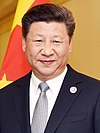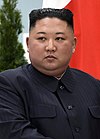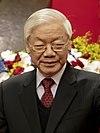Party_dictatorship
One-party state
State in which only one party has the right to form the government
A one-party state, single-party state, one-party system or single-party system is a governance structure in which only a single political party controls the ruling system.[1] All other parties are either outlawed or only enjoy limited and controlled participation in elections. Sometimes the term "de facto one-party state" is used to describe a dominant-party system that, unlike the one-party state, allows (at least nominally) democratic multiparty elections, but the existing practices or balance of political power effectively prevent the opposition from winning power.[2]
This article has multiple issues. Please help improve it or discuss these issues on the talk page. (Learn how and when to remove these template messages)
|
Membership in the ruling party tends to be relatively small compared to the population.[3] With such a small winning coalition, leaders in one-party states usually lack the incentive to care about the well-being of citizens.[4] Rather, they give out private goods to fellow elites to ensure continued support. One-party, compared to dominant-party dictatorships, structure themselves unlike democracies. They also turn into democracies at a lower rate than dominant-party dictatorships.[5] While one-party states prohibit opposition parties, some allow for elections at the smallest local level. One-party states lack any legitimate competition. Therefore, they place elites and sympathetic candidates in key administrative races.[6] For example, the Chinese Communist Party exercises political control by infiltrating village administrations.[7] They view these positions as crucial for gathering information on the population and maintaining a presence in the far reaches of their borders.[8] One-party states recognize the trade-off between election victory and gathering valuable data.[9] To account for this, the regimes have been observed placing local nobility in easy-to-win races.[10] One-party states have also been observed using elections to ensure that only the most popular elites get chosen to office.[11] They also gather data from elections to indicate if a local official is performing poorly in the eyes of the residents.[11] This gives locals the opportunity to monitor local officials and communicate satisfaction with the local government.[11] Throughout the country, members of the one party hold key political positions.[5] In doing so, the party avoids committing outright fraud and rather sustains their power at the local level with strategic appointment of elites.[8] Data on one-party regimes can be difficult to gather given their lack of transparency.[6]
As of 2024 the following countries are legally constituted as one-party states:
| Country | Head of party | Leader title | Party | Ideology | Date of establishment | Duration | Notes |
|---|---|---|---|---|---|---|---|
 |
General Secretary | Socialism with Chinese characteristics | 1 October 1949 | 74 years, 249 days | |||
 |
First Secretary | Marxism–Leninism, Castroism, Guevarism, Left-wing nationalism | 16 April 1961 | 63 years, 51 days | |||
 |
Chairperson | Eritrean nationalism, Statism | 24 May 1993 | 31 years, 13 days | |||
 |
General Secretary | Kaysone Phomvihane Thought | 2 December 1975 | 48 years, 187 days | |||
 |
General Secretary | Kimilsungism–Kimjongilism | 9 September 1948 | 75 years, 271 days | |||
 |
General Secretary | Ho Chi Minh Thought | 30 April 1975 | 49 years, 37 days |
A de facto one-party system is one that, while not officially linking a single political party to governmental power, utilizes some means of political manipulation to ensure only one party stays in power.[18] Many different countries have been claimed to be de facto one-party states, with differing levels of agreement between scholars, although most agree that the African continent is marked by this political system.[19][20][21] Below are just a few examples of governments that have been claimed to have single party rule due to political manipulation.
| Country | Party | Date of
establishment |
Information |
|---|---|---|---|
| Rwandan Patriotic Front | 1994 | Although Rwanda is nominally democratic, elections are manipulated in various ways, which include banning opposition parties, arresting or assassinating critics, and electoral fraud.[22][23] | |
| Arab Socialist Ba'ath Party | 2012 | While the 2012 constitution introduced by Bashar al-Assad theoretically enabled the establishment of political parties, Ba'athist Syria remains a de-facto one-party state with an extensive secret police apparatus that curtails independent political activities.[25] | |
| United Socialist Party of Venezuela | 2017/2024 | Since 2014, the country has been going through a period of crisis of legitimacy and exceptionality due to the order to close the National Assembly and the convocation of a Constituent Assembly by Nicolás Maduro on May 1, 2017, composed mostly of PSUV politicians. Since then, different laws have been approved to restrict political participation, including informal persecution and the disqualification of certain politicians (including complaints of electoral fraud), concluding in the year 2024 where, thanks to the new laws approved, the majority of opposition politicians have been disqualified and their organizations were banned, leaving only a controlled "opposition."[27][28] |
- The Republic of China controlled the mainland from 1912 to 1949 and the island of Taiwan since 1945, in which the ROC currently administers the Free area. This government served China in the United Nations from 1945 to 1971. See Political status of Taiwan and the One-China policy for various viewpoints.
- Following the appointment of Marcelo Caetano as Prime Minister in 1968, the opposition was allowed to run to the 1969 Portuguese legislative election, before being banned.
- Clark, William Roberts; Golder, Matt; Golder, Sona Nadenichek (23 March 2012). Principles of Comparative Politics. SAGE. p. 611. ISBN 9781608716791.
- "One-Party States | Encyclopedia.com". www.encyclopedia.com. Retrieved 21 February 2023.
- Angiolillo, Fabio (27 April 2023). "Introducing the One-Party Membership Dataset: A dataset on party membership in autocracies". Journal of Peace Research: 002234332311552. doi:10.1177/00223433231155278. ISSN 0022-3433.
- Hanson, Stephen E. (2009), "The Contribution of Area Studies", The SAGE Handbook of Comparative Politics, 1 Oliver's Yard, 55 City Road, London EC1Y 1SP United Kingdom: SAGE Publications Ltd, pp. 159–174, doi:10.4135/9780857021083.n10, ISBN 9781412919760, S2CID 184118662, retrieved 4 March 2023
{{citation}}: CS1 maint: location (link) - Magaloni, Beatriz; Kricheli, Ruth (1 May 2010). "Political Order and One-Party Rule". Annual Review of Political Science. 13 (1): 123–143. doi:10.1146/annurev.polisci.031908.220529. ISSN 1094-2939.
- Creak, Simon; Barney, Keith (10 August 2018). "Conceptualising Party-State Governance and Rule in Laos". Journal of Contemporary Asia. 48 (5): 693–716. doi:10.1080/00472336.2018.1494849. ISSN 0047-2336. S2CID 158403649.
- Hassan, Mai; Mattingly, Daniel; Nugent, Elizabeth R. (12 May 2022). "Political Control". Annual Review of Political Science. 25 (1): 155–174. doi:10.1146/annurev-polisci-051120-013321. ISSN 1094-2939. S2CID 241393914.
- MALESKY, EDMUND; SCHULER, PAUL (26 October 2011). "The Single-Party Dictator's Dilemma: Information in Elections without Opposition". Legislative Studies Quarterly. 36 (4): 491–530. doi:10.1111/j.1939-9162.2011.00025.x. ISSN 0362-9805.
- Frantz, Erica. Authoritarianism : what everyone needs to know. ISBN 978-0-19-756964-1. OCLC 1202872902.
- Frantz, Erica. Authoritarianism : what everyone needs to know. ISBN 978-0-19-756964-1. OCLC 1202872902.
- Gandhi, Jennifer; Lust-Okar, Ellen (1 June 2009). "Elections Under Authoritarianism". Annual Review of Political Science. 12 (1): 403–422. doi:10.1146/annurev.polisci.11.060106.095434. ISSN 1094-2939.
- Roman, Peter (2003). People's Power: Cuba's Experience with Representative Government. Rowman & Littlefield. ISBN 0-7425-2564-3.
- "Eritreans hope for democracy after peace deal with Ethiopia". BBC News. 17 July 2018. Retrieved 5 February 2023.
- "Laos: Freedom in the World 2020 Country Report". Freedom House. Retrieved 5 February 2023.
- "North Korea: Country Profile". Freedom House. Retrieved 5 February 2023.
- "Vietnam: Country Profile". Freedom House. 30 March 2022. Retrieved 5 February 2023.
- McLean, Iain; McMillan, Alistair (2009). "One-Party State". Oxford Reference. doi:10.1093/acref/9780199207800.001.0001. ISBN 978-0-19-920780-0. Retrieved 27 August 2023.
- Ziemer, Klaus (1995), Kirk-Greene, Anthony; Bach, Daniel (eds.), "The African One-Party State", State and Society in Francophone Africa since Independence, St Antony’s/Macmillan Series, London: Palgrave Macmillan UK, pp. 97–105, doi:10.1007/978-1-349-23826-2_7, ISBN 978-1-349-23826-2, retrieved 27 August 2023
- Mitchinson, Naomi (January 1984). "One party rule in Africa". The Round Table. 73 (289): 38–44. doi:10.1080/00358538408453617. ISSN 0035-8533.
- Schachter, Ruth (June 1961). "Single-Party Systems in West Africa". American Political Science Review. 55 (2): 294–307. doi:10.2307/1952240. ISSN 0003-0554.
- Thomson, Susan (2018). Rwanda: From Genocide to Precarious Peace. Yale University Press. p. 185. ISBN 978-0-300-23591-3.
- Ph.D, Joseph Sebarenzi; Twagiramungu, Noel (8 April 2019). "Rwanda's economic growth could be derailed by its autocratic regime". The Conversation. Retrieved 5 September 2023.
- Sources:
- Lucas, Scott (25 February 2021). "How Assad Regime Tightened Syria's One-Party Rule". EA Worldview. Archived from the original on 25 February 2021.
- Shively, Schultz, W. Phillips, David (2022). "7: Democracies and Authoritarian System". Power and Choice: An Introduction to Political Science. Rowman & Littlefield. p. 188. ISBN 9781538151860.
{{cite book}}: CS1 maint: multiple names: authors list (link) - Derbyshire, Derbyshire, J. Denis, Ian (2016). "Syria". Encyclopedia of World Political Systems. 711 Third Avenue, New York, NY 10017, USA: Routledge. p. 610. ISBN 978-0-7656-8025-9.
{{cite book}}: CS1 maint: location (link) CS1 maint: multiple names: authors list (link) - "Syria country profile". BBC News. 19 April 2023. Archived from the original on 20 April 2023.
- Lucas, Scott (25 February 2021). "How Assad Regime Tightened Syria's One-Party Rule". EA Worldview. Archived from the original on 25 February 2021.
- "NA: "Regime wants to build a one-party political system". El Universal (in Spanish). 18 June 2020. Retrieved 10 May 2024.
- Itriago Acosta, Andreina (2 April 2024). "'Anti-Fascism' Law to Tighten Crackdown on Venezuelan Opposition". www.bloomberg.com. Retrieved 10 May 2024.
- Maria Delgado, Antonio (5 April 2024). "Maduro prepared harsh law to further punish criticism of Venezuela regime". Miami Herald. Retrieved 9 May 2024.
- Afghanistan: A Country Study. Claitor's Law Books and Publishing. 2001. ISBN 978-1-57980-744-3.
- "Afghanistan 1977". Princeton University. Archived from the original on 6 April 2012.
- British Documents on Foreign Affairs. Reports and Papers from the Foreign Office Confidential Print: Burma, Ceylon, India and Pakistan. Volume 7. October 1947-December 1948. University Publications of America. 2001. p. 45. ISBN 155655768X.
- British Documents on Foreign Affairs. Reports and Papers from the Foreign Office Confidential Print: Burma, Ceylon, India and Pakistan. Volume 7. October 1947-December 1948. University Publications of America. 2001. p. 45. ISBN 155655768X.
- Mokam, David (2012). "The Search for a Cameroonian Model of Democracy or the Search for the Domination of the State Party: 1966-2006". Cadernos de Estudos Africanos (23): 85–108. doi:10.4000/cea.533.
- Vehesh, M. M.; Palinchak, M. M.; Marchuk, V. V.; Kontsur-Karabinovych, N. M. (2020). Carpathian Ukraine in the Central European political crisis on the eve of World War II (1938-1939): collective monograph (PDF). Liha-Pres. pp. 21, 22, 24. ISBN 9789663972121. Archived from the original (PDF) on 24 May 2023.
- Токар, М. (2004). "Становлення партійної монополії Українського Національного Обʼєднання" (PDF). Науковий вісник Ужгородського університету. Серія: Історія (11): 105–112. Archived from the original (PDF) on 24 May 2023.
- Токар, М. (2004). "Становлення партійної монополії Українського Національного Обʼєднання" (PDF). Науковий вісник Ужгородського університету. Серія: Історія (11): 106. Archived from the original (PDF) on 24 May 2023.
- Hepburn, A. (7 April 2004). Contested Cities in the Modern West. Springer. ISBN 978-0-230-53674-6.
- Delzell, Charles Floyd (18 June 1971). Mediterranean Fascism 1919–1945. Springer. ISBN 978-1-349-00240-5.
- [https://cris.mruni.eu/server/api/core/bitstreams/28fde780-25ce-44fa-bbba-7887e33ada25/content Ivanauskaitė-Pettinari, Kristina. POLITINIŲ PARTIJŲ TEISINIO STATUSO RAIDA LIETUVOJE 1918–1940 M. Doctoral dissertation. p. 1937]
- MacKinnon, Stephen R. (2007). China at War: Regions of China, 1937-45. Stanford University Press. ISBN 978-0-8047-5509-2.
- Bozarslan, Hamit (2019). "Afterword: Talaat's Empire: A Backward Country, but a State Well Ahead of Its Time". End of the Ottomans - The Genocide of 1915 and the Politics of Turkish Nationalism. I. B. Tauris. p. 330. ISBN 978-1-7867-3604-8.
- Raby, D. L. (1988). Fascism and Resistance in Portugal: Communists, Liberals and Military Dissidents in the Opposition to Salazar, 1941-1974. Manchester University Press. ISBN 978-0-7190-2514-3.
- Henderson, Jane (4 May 2011). The Constitution of the Russian Federation: A Contextual Analysis. Bloomsbury Publishing. ISBN 978-1-84731-648-6.
- Kumar, Kundan (2003). Ideology And Political System. Discovery Publishing House. ISBN 978-81-7141-638-7.
- "Presidential Decree on Syria's New Constitution". Syrian Arab News Agency. 28 February 2012. Retrieved 14 March 2012.
- Chulov, Martin (27 February 2012). "Syrian regime rockets bombard Homs". The Guardian. Guardian News and Media. Retrieved 14 March 2012.